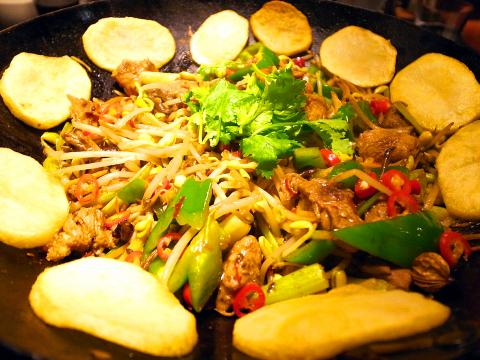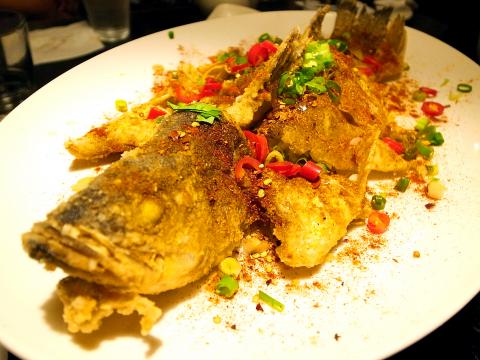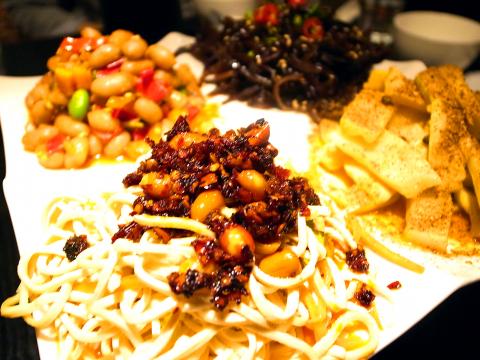Dining at Oriental Cuisine is like taking a crash course in Guizhou food, thanks to meticulous proprietor and chef David Yeh (葉國憲), who trekked to the mountainous region on the Yunnan-Guizhou Plateau in 2008 to study the locale’s style of Chinese cooking, which is celebrated for its complex spiciness and vinegary flavors.
Yeh is possibly the most diligent restaurateur I have ever encountered. On a recent visit, the neatly dressed chef not only took his time to greet our group of six and make recommendations while helming the kitchen, he also presented each dish and genially explained their origin and ingredients.
According to him, since the weather in Guizhou is often humid and chilly, the locals have long munched on a wide variety of spicy foods to stave off the cold.

Photo: Ho Yi, Taipei Times
Depending on the type of hot pepper used and how it is prepared and mixed with other spices, Guizhou cuisine has more than a dozen categories of spiciness, including sour spicy, (酸辣), oily spicy (油辣) and grilled spicy (糊辣).
For first-time diners, the assorted appetizer plate (四喜拼盤, NT$200 and NT$360) is a good starting point. Made with red chili that is first stir-fried with garlic and ginger, then tossed with peppercorns (花椒), the serving of oily spicy bamboo shoots (大紅袍油辣香筍) produces a tongue-tingling numbing sensation.
The pickled chili with peanuts (糟辣浸花生) showcases the pleasantly unique tang of fermented chili, while the vinegary black jelly fungus (醋溜黑木耳) refreshes the taste buds with its lovely tartness.

Photo: Ho Yi, Taipei Times
But don’t be fooled by the appetizers’ deceivingly simple appearance. My dining companions and I were all impressed by their nuanced flavors.
A delicacy traditionally cooked on special occasions, Miao chicken dry pot (苗寨乾鍋雞, NT$350 and NT$650) evolved from the iron pots that the region’s villagers used to cook with over fire pits.
To please local palates, Yeh’s rendition uses less oil and more vegetables — green pepper, celery, bean sprouts, slices of potato. The dish’s spiciness increases as the vegetables and chicken release their juices, which condense and thicken.

Photo: Ho Yi, Taipei Times
Sourness is another characteristic of Guizhou cuisine, and a good example is the Miao sour fish soup (苗家酸湯魚, NT$380 and NT$680). Using a light, sour broth made from fermented rice, the dish combines tomatoes and fermented chili to give sea perch an exciting kick.
Halfway through our evening spread, my dining partners and I started to plan our next visit to sample other signature dishes on the restaurant’s extensive menu. Topping our list is the sweat-inducing chicken (鎮店盜汗雞, NT$1,680), which requires eight hours of meticulous preparation to transform a clay pot filled with chicken and Chinese herbs into a piping hot pot of chicken soup, all without the addition of even a drop of water. The dish needs to be ordered at least one day in advance.
Eating at the two-story establishment is a comfortable experience. With a pleasant outdoor dining area on the balcony, the restaurant is very well kept and spacious, while the air is lightly scented with Chinese herbs and spices.
Located three minutes walk from Dazhi MRT Station (大直捷運站) exit No. 1, Oriental Cuisine is tucked away in a quiet alley adjacent to the park next to the main entrance of Shih Chien University (實踐大學).

Taiwan has next to no political engagement in Myanmar, either with the ruling military junta nor the dozens of armed groups who’ve in the last five years taken over around two-thirds of the nation’s territory in a sprawling, patchwork civil war. But early last month, the leader of one relatively minor Burmese revolutionary faction, General Nerdah Bomya, who is also an alleged war criminal, made a low key visit to Taipei, where he met with a member of President William Lai’s (賴清德) staff, a retired Taiwanese military official and several academics. “I feel like Taiwan is a good example of

March 2 to March 8 Gunfire rang out along the shore of the frontline island of Lieyu (烈嶼) on a foggy afternoon on March 7, 1987. By the time it was over, about 20 unarmed Vietnamese refugees — men, women, elderly and children — were dead. They were hastily buried, followed by decades of silence. Months later, opposition politicians and journalists tried to uncover what had happened, but conflicting accounts only deepened the confusion. One version suggested that government troops had mistakenly killed their own operatives attempting to return home from Vietnam. The military maintained that the

Before the last section of the round-the-island railway was electrified, one old blue train still chugged back and forth between Pingtung County’s Fangliao (枋寮) and Taitung (台東) stations once a day. It was so slow, was so hot (it had no air conditioning) and covered such a short distance, that the low fare still failed to attract many riders. This relic of the past was finally retired when the South Link Line was fully electrified on Dec. 23, 2020. A wave of nostalgia surrounded the termination of the Ordinary Train service, as these train carriages had been in use for decades

Lori Sepich smoked for years and sometimes skipped taking her blood pressure medicine. But she never thought she’d have a heart attack. The possibility “just wasn’t registering with me,” said the 64-year-old from Memphis, Tennessee, who suffered two of them 13 years apart. She’s far from alone. More than 60 million women in the US live with cardiovascular disease, which includes heart disease as well as stroke, heart failure and atrial fibrillation. And despite the myth that heart attacks mostly strike men, women are vulnerable too. Overall in the US, 1 in 5 women dies of cardiovascular disease each year, 37,000 of them